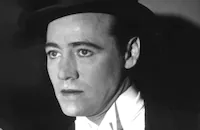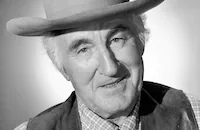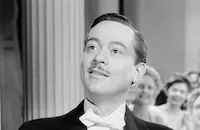Whispering Smith

Brief Synopsis
Cast & Crew
Leslie Fenton
Alan Ladd
Robert Preston
Donald Crisp
Brenda Marshall
William Demarest
Film Details
Technical Specs

Synopsis
In the Rocky Mountain division of a western railroad, the Barton brothers, Blake, Leroy and Gabby, a trio of thieving assassins, murder a guard on the Cheyenne express train. Railroad detective Luke Smith, called "Whispering" for his secretive way of investigating, is assigned to the case. In a night manhunt, Luke jumps a train and is reunited with an old friend, Murray Sinclair, who is in charge of the railroad's wrecking crew. A fire up ahead causes the train to stop as the Bartons shoot a depot operator. Arriving on the scene, Luke shoots Gabby and Leroy dead, but Blake escapes. In the mêlée, Luke is shot, but is saved by a harmonica in his pocket that was given to him by Murray's wife Marian, with whom he was once in love. Because his arm was nicked, Luke recuperates at Marian and Murray's ranch and discovers that Murray is involved with nefarious rancher Barney Rebstock and his gang. One day, Marian, who still loves Luke, tells him he should have married her five years earlier, even though he did not think he had enough to offer a wife. Believing Rebstock is hiding Barton in nearby Williams Canyon, Luke goes to town and gives him two days to run Barton out of the canyon. A gunfight follows, in which Luke kills Barton and is nearly killed by Rebstock's partner, Whitey Du Sang, whose involvement proves Rebstock's alliance with Barton. Marian, who has convinced Murray to stop the fight, arrives too late, and runs to Luke in relief, proving to Murray that his best friend and his wife are still in love. Later, Luke visits his old friends, Bill and Emmy Dansing, who run the town boardinghouse, and discusses with Bill the possibility that Murray has been funding his ranch by illegal means. Luke's suspicions are confirmed when, at the scene of a railroad wreckage, Murray orders his wrecking crew to fill his wagon with the spoils--much of which is salvageable. After George McCloud, the new division superintendent, orders Murray to unload the "loot" and is backed up by Luke, Murray and his crew defiantly smash the goods, and are fired. Luke admits to McCloud that Murray is stubborn, but agrees to appeal to the railroad president on his behalf to have him reinstated. Luke's request is denied, however, and Murray childishly blames Luke, who leaves town that night without even a good-bye from Murray. Rebstock then makes Murray his partner, and together they sabotage the railroad, derailing trains and stealing transported goods. Murray also begins frequenting the saloon in the evenings and consorting with friendly saloongirls. One night, Marian frankly tells Murray that his friends are wicked men, but he ignores her pleas. The railroad has, meanwhile, hired Luke to investigate the recent thefts, and he returns that night and comforts Marian. In the saloon, Luke tells Murray that everyone knows he was responsible for a recent theft of cattle, and offers to cover for him if he will break with Rebstock. Murray jealously accuses Luke of trying to steal Marian, and slugs him. Marian later tells Luke that she is leaving Murray, but Luke advises her to take Murray away instead so that he has a chance to reform. Murray agrees to leave after one last deal with Rebstock, and that night, during a train hold-up, Whitey kills a guard as Murray looks on. The next day, Luke, Bill and the sheriff lead a posse in search of the killer, and Whitey is identified. Marian tells Luke that Murray never came home after riding out with Rebstock the previous night. Meanwhile, Rebstock distributes the robbery's profits and pays Murray for his ranch. After Murray leaves, Whitey shoots Rebstock and absconds with the money. The posse locates the gang, and during a shootout, Murray is hit in the shoulder. Later, Luke kills Whitey, but allows Murray to escape. Murray returns to the ranch and, finding Marian packing, accuses her of running away with Luke. He then knocks her to the floor and orders her to prepare the buckboard. She finds Luke and Bill waiting in the barn, and Luke sends her with Bill to get a doctor. When Murray tries to shoot Bill and Marian, Luke shoots him in his side. Back in the house, Murray apologizes, while hiding a gun in his shirt. When Luke goes to fix him a drink, Murray pulls his gun on him, but is beaten to the draw by Luke. As his friend lays dying, Luke tells him he would have played it differently, but the only cards he had were the ones Murray dealt him. Murray dies, and Luke slowly rides away from the ranch.

Director

Leslie Fenton
Cast

Alan Ladd

Robert Preston

Donald Crisp

Brenda Marshall

William Demarest

Fay Holden

Murvyn Vye
Frank Faylen

John Eldredge
Robert Wood

J. Farrell Macdonald

Will Wright
Don Barclay
Eddy C. Waller
Ashley Cowan
Jimmie Dundee

Ray Teal
Bob Kortman
Tom Fadden
Milton Kibbee
James Hylan
Norton E. Worden
Pat Lane
Perry Ivins
Eric Alden
George Barton
George Bruggeman
Clint Dorrington
Robert St. Angelo
Fred Zendar
James Davies

Gary Gray
Ann Cameron
Roberta Jonay
Earle Hodgins
Lester Dorr
Paul E. Burns
Broderick O'farrell
Mike P. Donovan
Edgar Dearing
Roy Fiske
Tex Taylor
Ethan Laidlaw
Vaughn Anthony
Frank Hagney
Don Lynch
Terry Frost
Budd Fine
Ed Randolph
Billy Burt
Crew
Guy Bennett
Robert Brower
Robert Burns
Frank Butler
Sam Comer
John Cope
Francisco Day
Adolph Deutsch
Mary Kay Dodson
Hans Dreier
Farciot Edouart
Mel Epstein
Bertram Granger
Lupe Hall
Gordon Jennings
Natalie Kalmus
Karl Kamb
Herman H. Larsen
Nellie Manley
Archie Marshek
Gene Merritt
William Mull
Ray Rennahan
G. E. Richardson
Darrell Turnmire
Walter Tyler
Wally Westmore

Film Details
Technical Specs

Articles
Whispering Smith
Ladd plays railroad detective Luke Smith, dubbed "Whispering" because of his quiet voice and demeanor and his stealthy investigation of crimes. One such investigation brings him into contact with an old friend who is now married to Smith's former flame and involved in shady doings with a gang of train robbers. The part carried echoes of Ladd's later Western classic Shane (1953) in the character's calm but deadly comportment, his gentleness with women and children, his loyalty to friends and his devotion to an unavailable woman (named Marian in both films).
The character of Luke Smith is loosely based on real-life lawman Joe Lefors. Frank Spearman's quiet but deadly lawman from the novel upon which the story is based appeared several times in previous movies, both in the silent era and in the 1930s, with George O'Brien as Smith. It later formed the basis of a TV series starring war-hero-turned-Western-star Audie Murphy. Smith's old friend, played by Robert Preston, is also said to be loosely based on a legendary Westerner, Butch Cassidy, who was depicted on screen numerous times, most famously in the person of Paul Newman in Butch Cassidy and the Sundance Kid (1969).
Whispering Smith was the last of five pictures Ladd made with Robert Preston. The two had become friendly in their years at Paramount, but Preston left the studio not long after this for a successful freelance career in film and theatre. Ladd, a secretive, sometimes withdrawn man whose personal demons eventually led to the alcoholism that would take his life in 1964 at the age of 50, formed very few close friendships.
This was the first time back on screen for Brenda Marshall after taking a few years off to raise her children with longtime husband William Holden. Marshall, who always insisted people refer to her by her real name, Ardis, rather than the studio-concocted moniker, only made one more feature after Whispering Smith before retiring for good.
The Western town setting in the picture, a first for Paramount, was constructed on studio property. The five-acre set included 2000 feet of railroad track on which authentic 1870 locomotives owned by Paramount were operated. The trains, however, were converted from their original wood-burning fuel system to oil. The set was later used for the popular TV series Bonanza and many other shows and movies.
Director: Leslie Fenton
Producer: Mel Epstein
Screenplay: Frank Butler, Karl Kamb, based on the novel by Frank H. Spearman
Cinematography: Ray Rennahan
Editing: Archie Marshek
Art Direction: Hans Dreier, Walter Tyler
Original Music: Adolph Deutsch
Cast: Alan Ladd (Luke "Whispering" Smith), Robert Preston (Murray Sinclair), Brenda Marshall (Marian Sinclair), Donald Crisp (Barney Rebstock), William Demarest (Bill Dansing).
C-89m.
by Rob Nixon

Whispering Smith
Quotes
Barney heard you'd been shot up. He asked after ya.- Murray Sinclair
Yeah, he seemed mighty disappointed when he heard you wasn't buried yet.- Bill Dansing
Trivia
Notes
A pre-production news item in the Los Angeles Times stated that Sidney Biddell would be producing this film and that Marion Parsonnet would be writing the screenplay with Karl Lamb; however, Biddell and Parsonnet's contribution to the released film has not been confirmed. According to Par News, for the first time in Hollywood history, a full-scale Western town was built for the film on a studio backlot. The five-acre set included 2,000 feet of railroad track. Locomotives from 1870 that were owned by Paramount were converted from wood-burning to oil for use in the film. Technical advisor Herman H. Larsen was formerly the general manager of Union Pacific Railroad, headquartered in Omaha, NE. Paramount publicized the film as Alan Ladd's first Western and first film in Technicolor. The New York Times review remarked, "Considering the law of gravitation and the parabolic course of Alan Ladd, it had to be that this star performer would land, sooner or later, into a Western film." The film marked Brenda Marshall's return to the screen following a three-year absence from the screen to rear her children after her marriage to actor William Holden.
Frank H. Spearman's novel has been the basis of other motion pictures, beginning in 1916 with the Mutual Film Corp. release Whispering Smith, directed by J. P. MacGowan, starring himself as the title character, with Helen Holmes and Paul C. Hurst. Mutual also released a sequel to the first film in 1916, again directed by MacGowan and starring him, Holmes and Hurst. Universal released a film entitled Money Madness in 1917 which featured the character of Whispering Smith, portrayed by Charles H. Mailes. That film was directed by Henry McRae (see AFI Catalog of Feature Films, 1911-20; F1. 2893, 3037 and 4926). Producers Distributing Corp. released Whispering Smith in 1926, directed by George Melford and starring H. B. Warner and Lilyan Tashman (see AFI Catalog of Feature Films, 1921-30; F2. 6286). A serial entitled Whispering Smith Rides was produced by Universal in 1927. Sol Lesser produced a film entitled Whispering Smith Speaks in 1936, a Twentieth Century-Fox release directed by David Howard, starring George O'Brien and Irene Ware. This film, like the 1952 British film released by RKO, Whispering Smith vs. Scotland Yard, was based on the character Whispering Smith, but not on Spearman's novel. An NBC television series that was also based on the character and inspired by the novel ran from 15 May-September 18, 1961 and starred Audie Murphy, Guy Mitchell and Sam Buffington.















